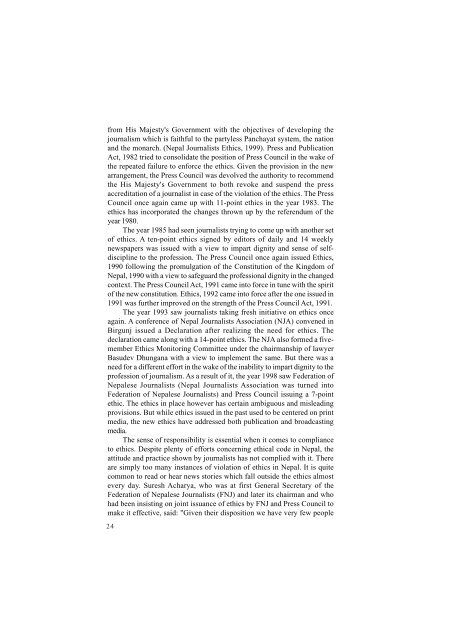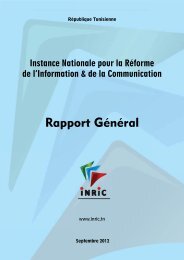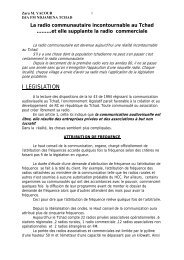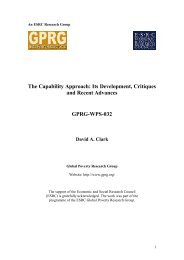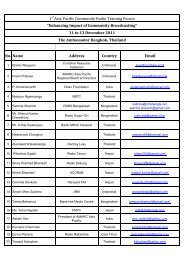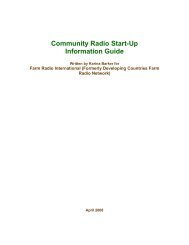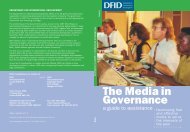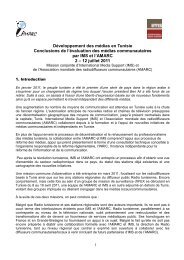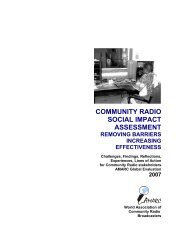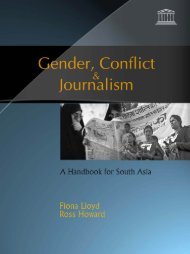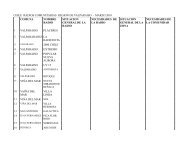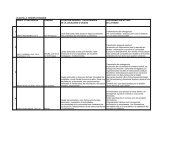Community Radio Pledge (pdf) - amarc
Community Radio Pledge (pdf) - amarc
Community Radio Pledge (pdf) - amarc
- No tags were found...
You also want an ePaper? Increase the reach of your titles
YUMPU automatically turns print PDFs into web optimized ePapers that Google loves.
from His Majesty's Government with the objectives of developing thejournalism which is faithful to the partyless Panchayat system, the nationand the monarch. (Nepal Journalists Ethics, 1999). Press and PublicationAct, 1982 tried to consolidate the position of Press Council in the wake ofthe repeated failure to enforce the ethics. Given the provision in the newarrangement, the Press Council was devolved the authority to recommendthe His Majesty's Government to both revoke and suspend the pressaccreditation of a journalist in case of the violation of the ethics. The PressCouncil once again came up with 11-point ethics in the year 1983. Theethics has incorporated the changes thrown up by the referendum of theyear 1980.The year 1985 had seen journalists trying to come up with another setof ethics. A ten-point ethics signed by editors of daily and 14 weeklynewspapers was issued with a view to impart dignity and sense of selfdisciplineto the profession. The Press Council once again issued Ethics,1990 following the promulgation of the Constitution of the Kingdom ofNepal, 1990 with a view to safeguard the professional dignity in the changedcontext. The Press Council Act, 1991 came into force in tune with the spiritof the new constitution. Ethics, 1992 came into force after the one issued in1991 was further improved on the strength of the Press Council Act, 1991.The year 1993 saw journalists taking fresh initiative on ethics onceagain. A conference of Nepal Journalists Association (NJA) convened inBirgunj issued a Declaration after realizing the need for ethics. Thedeclaration came along with a 14-point ethics. The NJA also formed a fivememberEthics Monitoring Committee under the chairmanship of lawyerBasudev Dhungana with a view to implement the same. But there was aneed for a different effort in the wake of the inability to impart dignity to theprofession of journalism. As a result of it, the year 1998 saw Federation ofNepalese Journalists (Nepal Journalists Association was turned intoFederation of Nepalese Journalists) and Press Council issuing a 7-pointethic. The ethics in place however has certain ambiguous and misleadingprovisions. But while ethics issued in the past used to be centered on printmedia, the new ethics have addressed both publication and broadcastingmedia.The sense of responsibility is essential when it comes to complianceto ethics. Despite plenty of efforts concerning ethical code in Nepal, theattitude and practice shown by journalists has not complied with it. Thereare simply too many instances of violation of ethics in Nepal. It is quitecommon to read or hear news stories which fall outside the ethics almostevery day. Suresh Acharya, who was at first General Secretary of theFederation of Nepalese Journalists (FNJ) and later its chairman and whohad been insisting on joint issuance of ethics by FNJ and Press Council tomake it effective, said: "Given their disposition we have very few people24


